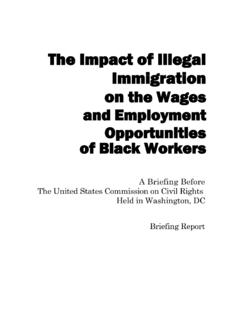Transcription of POLICE USE OF FORCE: TION OF MODERN POLICING PRACTICES
1 COMMISSION ON CIVIL RIGHTSNOVEMBER 2018 BRIEFING REPORT POLICE USE OF FORCE: AN EXAMINATION OF MODERNPOLICING COMMISSION ON CIVIL RIGHTS Washington, DC 20425 Official BusinessPenalty for Private Use $300 Visit us on the Web: COMMISSION ON CIVIL RIGHTSThe Commission on Civil Rights is an independent, bipartisan agency established by Congress in 1957. It is directed to: Investigate complaints alleging that citizens are being deprived of their right to vote by reason of their race, color, religion, sex, age, disability, or national origin, or by reason of fraudulent PRACTICES . Study and collect information relating to discrimination or a denial of equal protection of the laws under the Constitution because of race, color, religion, sex, age, disability, or national origin, or in the administration of justice. Appraise federal laws and policies with respect to discrimination or denial of equal protection of the laws because of race, color, religion, sex, age, disability, or national origin, or in the administration of justice.
2 Serve as a national clearinghouse for information in respect to discrimination or denial of equal protection of the laws because of race, color, religion, sex, age, disability, or national origin. Submit reports, findings, and recommendations to the President and Congress. Issue public service announcements to discourage discrimination or denial of equal protection of the OF THE COMMISSIONC atherine E. Lhamon, ChairPatricia Timmons-Goodson, Vice ChairDebo P. Adegbile*Gail HeriotPeter N. KirsanowDavid KladneyKaren K. NarasakiMichael YakiMauro Morales, Staff Commission on Civil Rights 1331 Pennsylvania Avenue, NW Washington, DC 20425(202) 376-8128 voice TTY Relay: 42 1975a.*Denotes Commissioner s recusal from the report. POLICE Use of Force: An Examination of MODERN POLICING PRACTICES Briefing Before The United States Commission on Civil Rights Held in Washington, DC Briefing Report [This page intentionally left blank] Letter of Transmittal November 15, 2018 President Donald J.
3 Trump Vice President Mike Pence Speaker of the House Paul Ryan On behalf of the United States Commission on Civil Rights ( the Commission ), I am pleased to transmit our briefing report, POLICE Use of Force: An Examination of MODERN POLICING PRACTICES . The report is also available in full on the Commission s website at In this report, the Commission investigated rates of POLICE use of force; whether rates and instantiations of that use of force violate civil rights of persons of color, persons with disabilities, LGBT communities, and low-income persons; promising or proven policies and PRACTICES worth replicating to minimize unnecessary use of force; and the perception and reality of discrimination in POLICE use of force. The Commission considered evidence from law enforcement and court officials, community leaders and POLICE reform advocates, scholars, legal experts, as well as testimony taken in by the Commission s State Advisory Committees in Minnesota, New York, Maine, and Delaware.
4 The Commission majority approved key findings including the following: While POLICE officers have the difficult and admirable job of providing crucial services to the communities they protect and serve, their job sometimes puts them in harm s way and may require the use of force. Accordingly, POLICE officers must operate with the highest standards of professionalism and accountability. Every community resident should be able to live, work, and travel confident in an expectation that interactions with POLICE officers will be fair, consistent with constitutional norms, and guided by public safety free from bias or discrimination. Unfortunately, too many communities are not confident in these expectations, and so these communities have called for reforms to foster better community- POLICE relations and prevent unjustified and excessive POLICE uses of force. Accurate and comprehensive data regarding POLICE uses of force is generally not available to POLICE departments or the American public.
5 No comprehensive national database exists that captures POLICE uses of force. The best available evidence reflects high rates of uses of force nationally, with increased likelihood of POLICE use of force against people of color, people with disabilities, LGBT people, people with mental health concerns, people with low incomes, and those at the intersection of these communities. Lack of sufficient training and funding for training leaves UNITED STATES COMMISSION ON CIVIL RIGHTS 1331 Pennsylvania Ave., NW Suite 1150 Washington, DC 20425 officers and the public at risk. Repeated and highly publicized incidents of POLICE use of force against persons of color and people with disabilities, combined with a lack of accurate data, lack of transparency about policies and PRACTICES in place governing use of force, and lack of accountability for noncompliance foster a perception that POLICE use of force in communities of color and the disability community is unchecked, unlawful, and unsafe.
6 The Commission majority voted for key recommendations, including that the United States Department of Justice should return to vigorous enforcement of constitutional POLICING , including under its authority pursuant to 42 14141, and the use of consent decrees where necessary to ensure that constitutional POLICING standards are upheld. The Department of Justice should robustly support local efforts to develop and institute constitutional POLICING PRACTICES , including through the Office of Community Oriented POLICING Services (COPS) and maintaining the Community Relations Service (CRS) to focus on building community trust and reducing excessive or unauthorized uses of force, in coordination with POLICE departments. The Commission majority also called on Congress to fund grants, facilitated by the Department of Justice, to incentive evidence-based PRACTICES that, when employed, reduce incidents of excessive or unauthorized force.
7 These PRACTICES may include increased training on de-escalation tactics and alternatives to use of force. Congress should also fund grants that support effective external POLICE oversight and research regarding best PRACTICES for such oversight. The Commission majority called for practical reforms to stem the tide of perceived conflict between POLICE officers and their communities, and to recommit this nation to the principles of fairness and equal treatment, including at the hands of POLICE , that are core to democracy. These recommendations for forward progress are measured, appropriate, and urgent; our nation s communities need their implementation. We at the Commission are pleased to share our views, informed by careful research and investigation as well as civil rights expertise, to help ensure that all Americans enjoy civil rights protections to which we are entitled. For the Commission, Catherine E. Lhamon Chair Table of Contents i TABLE OF CONTENTS TABLE OF CONTENTS.
8 I ACKNOWLEDGEMENTS .. iii EXECUTIVE SUMMARY .. 1 Highlighted Findings: .. 3 Highlighted Recommendations: .. 4 Chapter 1: Introduction: Definitions, Data, and Major Theoretical Perspectives .. 7 Defining Excessive Use of Force .. 9 State of National Data Collection .. 12 Existing Data on Lethal and Non-Lethal Use of Force .. 21 Disparities in Use of Force .. 22 Explanations for and Analysis of Rates of POLICE Use of Force .. 25 Inevitability Argument .. 26 Systemic Perspectives .. 41 Chapter 2: POLICE Oversight And Accountability .. 55 Internal Accountability .. 55 Body-Worn Cameras .. 63 External Oversight .. 73 Civilian Review Boards .. 74 Grand Juries .. 78 Qualified Immunity .. 82 Consent 86 Chapter 3: Changing Law Enforcement Behavior .. 97 A Holistic Approach to Reforming the Overall POLICING System .. 97 Racial Diversity .. 99 Training .. 101 Implicit Bias Training .. 103 De-escalation Training .. 113 Mental Health and Disability Training .. 126 Building Community Trust.
9 131 POLICE Use of Force ii Chapter 4: Findings and Recommendations .. 137 137 Community Trust .. 137 Data .. 137 Training .. 138 Accountability .. 138 Recommendations .. 139 Commissioners Statements, Rebuttals, and Surrebuttals .. 143 Statement of Chair Catherine E. Lhamon .. 143 Statement of Vice Chair Patricia Timmons-Goodson .. 147 Statement of David Kladney .. 153 Statement of Commissioner Karen K. Narasaki .. 171 Statement of Commissioner Gail Heriot .. 181 Dissenting Statement of Commissioner Peter Kirsanow .. 197 Rebuttal of Commissioner David Kladney .. 218 Acknowledgements iii ACKNOWLEDGEMENTS The Office of Civil Rights Evaluation (OCRE) produced the final version of this report under the direction of Katherine Culliton-Gonz lez, Esq, OCRE Director. Dr. Marik Xavier-Brier, Civil Rights Analyst, performed principal research and writing. Interns Madison Hubbard, Michigan State University, Krista Painter, University of Texas, Sabrina Escalera-Flexhaug, American University, Washington College of Law, and Aaron Hurd, Indiana University, Maurer School of Law also provided valuable research and legal assistance.
10 Commissioners and Commissioner Special Assistants Sheryl Cozart, Jason Lagria, Carissa Mulder, Amy Royce, Rukku Singla, and Alison Somin conducted research, edited, and examined the report. The Commission s General Counsel Maureen Rudolph reviewed and approved the report for legal sufficiency. State Advisory Committees in Delaware, Maine, Minnesota, and New York collected and provided testimony, findings, and recommendations to the Commission on POLICING issues with their jurisdictions. POLICE Use of Force iv [This page intentionally left blank] Executive Summary 1 EXECUTIVE SUMMARY The relationship between law enforcement and many communities in the is fraught and challenging, particularly for those who experience violent crimes coupled with intensive POLICE presence and surveillance. A number of recent developments suggest a renewed commitment to resolving this issue. For the first time in decades, the country has witnessed ubiquitous and sustained protests by young people, communities of color, and other impacted populations in cities all across the Further, in hope of fostering better community- POLICE relationships, many law enforcement and city officials around the country have started implementing reform strategies to allay communities concerns about actual or perceived unfair and unequal POLICING .









